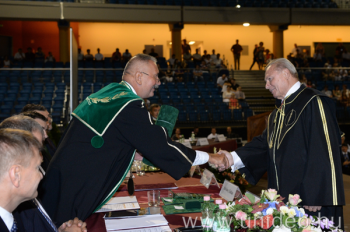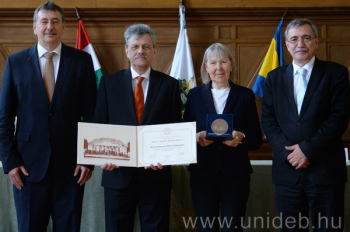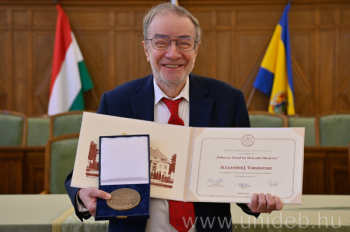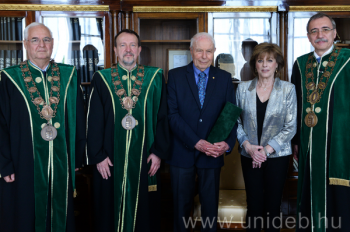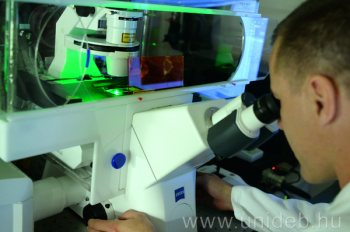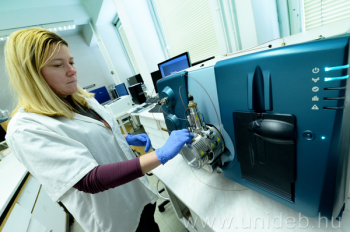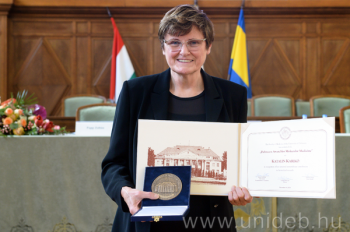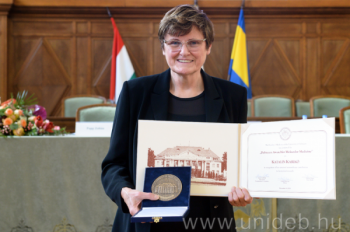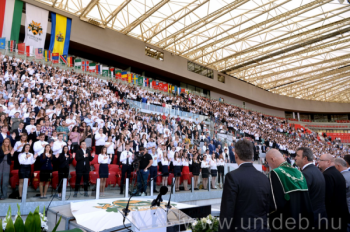The team of the Faculty of Engineering of the University of Debrecen won 3rd place in the Best Presentation category at a conference held in Singapore. The main aim of the International Conference on E-Learning in Industrial Electronics is to present the connection between modern education and e-learning methods.
Hírek Award címkével
Rudolf Schuster, former President of the Slovak Republic, celebrates his 90th birthday on 4 January. The politician, who played a key role in deepening Slovak-Hungarian relations, was awarded the Civis Honoris Causa award, one of the most prestigious honours of the University of Debrecen in 2016.
In recognition of her revolutionary achievements in the treatment of neonatal diabetes, Professor Dame Frances Mary Ashcroft of the Institutes of Physiology at the University of Oxford was awarded the "Debrecen Prize for Molecular Medicine" in 2020. Due to the Covid pandemic, the British professor conducting research into the physiology of ion channels was only able to accept the award of the Faculty of Medicine of the University of Debrecen this year from László Csernoch, vice rector for scientific affairs and László Mátyus, dean of UD.
The Faculty of Medicine of the University of Debrecen has awarded molecular biologist Alexander Varshavsky the Debrecen Award for Molecular Medicine this year. Professor Varshavsky, who lives and works in the United States, owes his international fame chiefly to the discovery of protein degradation processes realized through the so-called ubiquitin system. This year’s awardee received the recognition on Tuesday at a ceremony held in the Aula [University Hall] venue of the Main Building, where he also delivered a lecture on his scientific achievements.
Avram Hershko, a world famous chemist from Israel has received this year’s University of Debrecen Science Impact Award (uDEsia) at UD. The Nobel laureate researcher received the university’s highest scientific award from László Csernoch, vice rector for scientific affairs.
Both Magyar Celluláris Képalkotó [Cellular Imaging Hungary], established through the coordinating activity of the University of Debrecen, and Magyar Orvosi és Preklinikai Képalkotó Laboratórium [Medical and Preclinical Imaging Hungary] have been recognized recently as locations for the most outstanding research infrasructure in Hungary. Each of these two laboratories are accredited members of the Euro-BioImaging ERIC [European Research Infrastructure Consortium].
The Proteomics Core Facility of the University of Debrecen, which primarily focuses on studying proteins, has been recognised as one of the best research facilities in Hungary. The compilation of the list that contains the best 50 Hungarian research facilities was initiated by the National Research, Development and Innovation Office.
Katalin Karikó has offered the entire amount that she received along with the Debrecen Award for Molecular Medicine for research programmes carried out at the University of Debrecen and for talent management. The Hungarian research biologist, who patented the synthetic mRNA-based vaccine technology, received the prize in December.
This year the Debrecen Award for Molecular Medicine went to Katalin Karikó. The Hungarian Széchenyi laureate research biologist, who patented the synthetic mRNS-based vaccine technology, received the prize at a ceremony held at the University of Debrecen on Tuesday. She also gave a presentation to the audience.
“The state has not released the hands of the universities, and in fact it provides more resources than ever before,” emphasized László Palkovics, Minister of Innovation and Technology, at the opening ceremony of the UD in the Nagyerdei Stadium. Approximately 10000 freshers are starting the new year.

